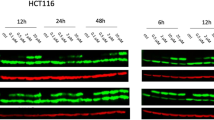Abstract
2-Chloro-9-(2-deoxy-2-fluoro-β-D-arabinofuranosyl) adenine (Cl-F-araA) is a novel deoxyadenosine analog, which inhibits DNA synthesis by inhibiting DNA polymerase α and ribonucleotide reductase. Cl-F-araA shows potent antiproliferative activity against several leukemic cell lines including those of human origin and is also effective against murine solid tumors, in particular being curative against colon tumors. Purpose: We therefore decided to investigate whether Cl-F-araA is effective against human colon tumors, in particular by oral administration, since it has improved stability compared with other deoxyadenosine analogs. Methods: Antiproliferative activity in vitro was determined from cell counts. Subcutaneously inoculated xenograft models and a liver micrometastases model were used for assessment of antitumor activity in vivo. Results: Cl-F-araA showed potent antiproliferative activity against four human colon tumor cell lines (HCT116, HT-29, DLD-1, WiDr), with a 50% growth-inhibitory concentration (IC50) of 0.26 μM with a 72-h exposure. This activity was greater than those of fludarabine desphosphate and cladribine, other deoxyadenosine analogs, which showed IC50 values of 19 μM and 0.35 μM, respectively. Cl-F-araA showed potent antitumor activity against four human colon tumor xenograft models (HT-29, WiDr, Co-3, COLO-320DM) in a 5-day daily administration schedule, which was shown to be the most effective of three administration regimens tested (single, twice-weekly, 5-day daily). In particular, oral administration showed significantly superior activity, with a regressive or cytostatic growth curve, compared with intravenous administration. In addition, Cl-F-araA was effective at only one-sixteenth of the maximum dose tested in a 10-day daily administration schedule. Therapeutic efficiency seemed to increase in proportion to the frequency of administration. Cl-F-araA also decreased liver micrometastases created by intrasplenic injection of human colon tumor cells, leading to complete suppression at the maximum dose tested. Conclusions: These results suggest that Cl-F-araA might be clinically effective against human colon cancers using a daily oral administration schedule.
Similar content being viewed by others
Author information
Authors and Affiliations
Additional information
Received: 20 February 1998 / Accepted: 29 June 1998
Rights and permissions
About this article
Cite this article
Takahashi, T., Kanazawa, J., Akinaga, S. et al. Antitumor activity of 2-chloro-9-(2-deoxy-2-fluoro-β-D-arabinofuranosyl) adenine, a novel deoxyadenosine analog, against human colon tumor xenografts by oral administration. Cancer Chemother Pharmacol 43, 233–240 (1999). https://doi.org/10.1007/s002800050889
Issue Date:
DOI: https://doi.org/10.1007/s002800050889




